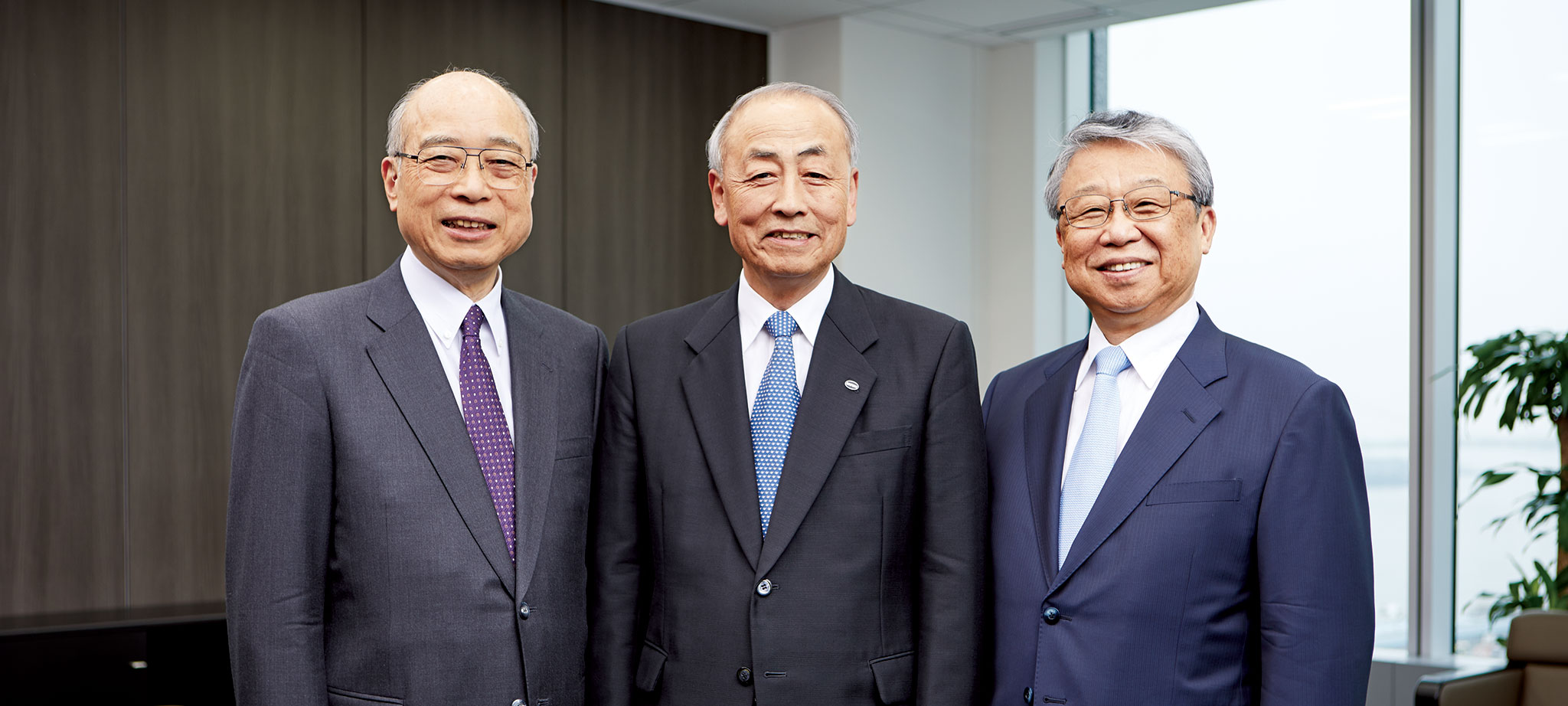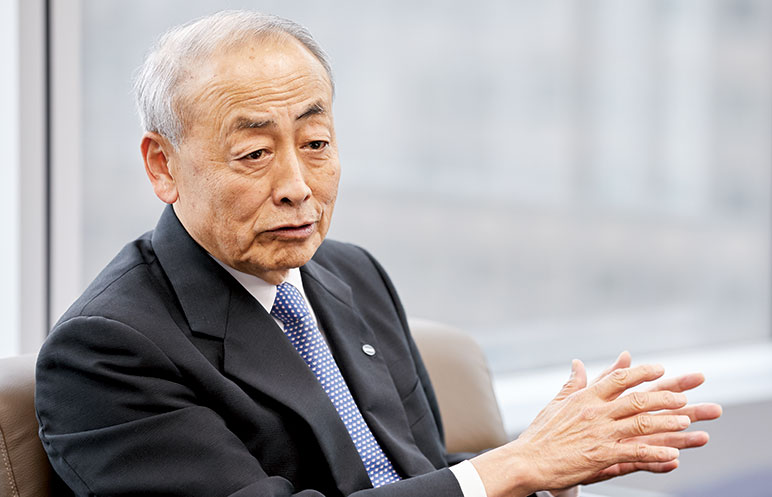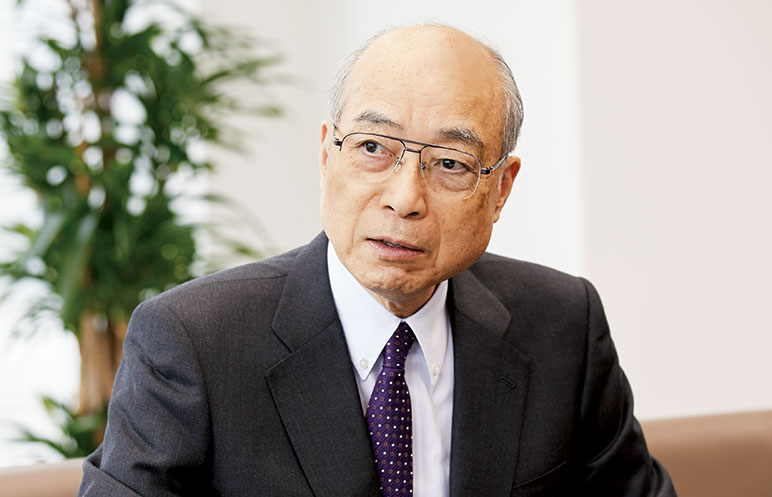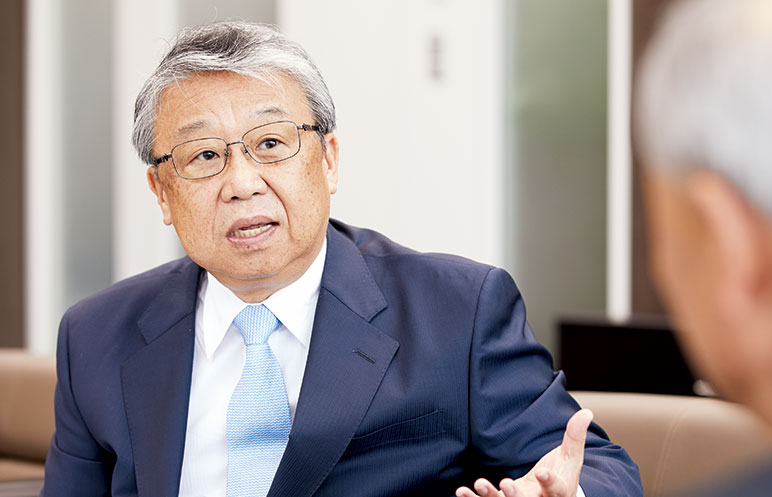Discussion Between the President and Outside Directors

Building Daifuku’s Global Governance Structure
- Noboru Kashiwagi
Outside Director
Independent Officer - Masaki Hojo
President and CEO - Yoshiaki Ozawa
Outside Director
Independent Officer
Localization and Globalization—the Key Theme of the New “Value Innovation 2020” Business Plan
President Hojo: Daifuku’s younger executives representing the next generation participated in the formulation of the new medium-term business plan, Value Innovation 2020. With non-Japan sales now consistently exceeding 60% of revenue, we held extensive discussions on the sort of corporate governance and management structures we want to establish, including companies acquired through M&A. One of the major themes that emerged was globalization with locally generated communication, rather than the conventional style of communication originating from Japan. I’d like to hear your views and suggestions on the balance of localization and globalization.
Director Ozawa: Localization and globalization are generally considered to be contradictory. The gradual integration of the world economy is called “globalization,” with optimal global procurement and marketing necessary to maintain sales. In contrast, the usual meaning of “localization” is inward-looking corporate management, conducting business only within a single country. However, Daifuku considers “localization” in the sense of achieving harmony and an optimal balance with globalization, and conducting business as a single organization. I’ve come across several cases where Japanese companies are unable to manage their subsidiaries, and so entrust the entire operation to local managers, which they refer to as “localization.” The post-merger integration of acquisition targets is extremely difficult, not least due to the language barriers. The point is to leave production and sales to on-site affiliates, with the parent company managing capital and figures in a timely and appropriate manner.
An additional point is the internationalization of the workforce. This requires more than just using English internally, and hiring more foreign employees. Companies need to rethink their approach to the sort of things that used to be called “Japanese-style management,” concepts such as “creating an atmosphere of unspoken understanding” or “reading between the lines” that non-Japanese may not readily recognize. I believe that one of Daifuku’s strengths is the sense of loyalty and mutual trust within the Company—the essence of Japanese-style management—but I feel that, for implementing globalization, it would be best to reconsider the current state of Japanese-style management.
Director Kashiwagi: Reconciling global and local management is a difficult issue for any company. One time at a trading company, I’ve heard presidents and branch managers of overseas subsidiaries refer to themselves half-jokingly as “boarding house masters” looking after the employees dispatched from the business division of the parent company. However, there were also many highly capable subsidiary presidents who not only take care of dispatched employees, but create strong networks of contacts and information in their respective areas, supporting the work of business managers so that they don’t become boarders from the parent company. The gears engage with each other, with overseas subsidiary presidents bringing a local perspective, and employees dispatched from the parent company conveying the headquarters’ global outlook. Growth strategies vary by region, differing according to the current situation and nature of business in each country. It’s necessary to consider the balance of globalization and localization as the occasion requires. There is no one correct answer or equation.
President Hojo: Daifuku’s global business expansion began with local installations and services provided to Japanese companies expanding production outside of Japan. Today, we need to identify business with local customers to expand operations. We should incorporate local aspects, while also transferring Daifuku’s strengths to regional areas. It may be a world without correct answers, but I hope we are able to create a satisfactory structure over the next four years.
Daifuku’s Corporate Governance

Non-Japan sales now consistently account for more than 60% of revenues, and how to balance localization with globalization and build a corporate governance structure are priority issues.
Masaki Hojo
Director Kashiwagi: In any large company, the organization tends to age, and some kind of action is required. However, even though Daifuku has been operating for 80 years, I admire its youthful corporate atmosphere of lively and energetic discussion where employees feel free to speak their minds. At a meeting of the Board of Directors the other day, Executive Vice President Tanaka stated, “We don’t believe in behind-the-scenes maneuvering or prior consultation, called nemawashi in Japanese,” and I felt this was a positive stance. Encouraging people to be on the “same page” ahead of time leads to a situation that overly prioritizes group harmony and risk avoidance, resulting in the company gradually losing its edge. I believe this is one reason for a decline at Japanese companies. In that sense, even though Daifuku as a company is 80 years old, I feel that it has a very youthful corporate spirit.
I also have an extremely strong sense that Daifuku is in step with the trend of the times. With continued innovation in logistics, demand for Daifuku’s systems will continue to grow.
Director Ozawa: Daifuku seems to have skillfully adapted its business model to fit the changing times. Its business has been expanded in response to automation in the automobile industry, factory automation among machinery and electronic manufacturers, and cleanroom semiconductor and flat-panel display production lines. Daifuku’s roots may be in conveyor or transport systems, but it has used its core technologies and successfully adapted to the changing times.
Director Kashiwagi: I have exactly the same thought. A keen sense for the times and ability to change are extremely important.
President Hojo: Daifuku has been earnestly developing new products to meet customer needs. We have no time to play defense, or engage in “behind-the-scenes maneuvering” to ensure others are on the “same page.”
This attitude of continual challenge has allowed us to encounter good customers who come to us to find new solutions, and we work diligently to meet those needs. We tend to act rather than deliberate and get the work done.
Director Ozawa: I agree it’s important to change. Risk management does not mean never taking any risks. Without risk, there is no return. The point is to understand the risks and manage them accordingly, which Daifuku is doing so far. I believe now it’s vital for Daifuku to skillfully manage those risks and face the challenge of meeting customer needs.
President Hojo: Finally, how should we in management instill in our employees the principles of compliance, corporate governance, and the Company’s responsibilities to society going forward? We hold activities to raise awareness, but what is the best approach to ensure employees have a deep understanding? I’d like to hear your suggestions.

Rather than thinking about localization and globalization in the usual way, I believe it’s important to combine and optimize both local and global activities in each of Daifuku’s business divisions, and consider the balance of global and local management from the standpoint of the worldwide strategies of the entire Daifuku Group.
Noboru Kashiwagi
Director Kashiwagi: Training courses are essential, but not terribly effective. It’s common knowledge in educational theory that lectures are the least effective educational technique.
The most effective method in terms of compliance is not to hold a lot of training sessions, but for top management to occasionally speak on the importance of having integrity as a company. For example, it’s to mention in the New Year’s address how compliance is extremely important, or demonstrate a clearly disapproving attitude toward a director who makes an anti-compliant remark during a meeting of the Board of Directors. I believe top management expressing their position on compliance is the most effective method. The current Daifuku management has been steadily communicating such a message at least since the time of the late Chairman Katsumi Takeuchi.
Director Ozawa: Ultimately, everything is determined by how executives consider and act. Unless executives sincerely accept their social responsibility and act in a timely and appropriate manner, the company will be unable to fulfill its social responsibilities no matter how splendid it looks from the outside. It’s important for executives to take the initiative and act while continually bearing in mind the lessons of the past and fundamental principles. Daifuku is underpinned by loyalty, and the lessons of a harmonious atmosphere and everyday sensibility are important components that have fostered and developed its corporate culture.
Director Kashiwagi: I recently learned an interesting expression, “Don’t cut corners for numbers.” In essence, don’t be deceptive just to make sales numbers or other figures look better. Moreover, aim for high performance with high integrity. I wholeheartedly agree with this. Daifuku’s management is regularly sending the message to never be dishonest to boost numbers. I believe the Company and its management are incredibly trustworthy.

An essential component of corporate governance is management control. It’s important for the president and all management to communicate a clear message to the Group companies, and to exercise global control over those companies to ensure their transparency in line with that message. Daifuku’s management control has improved each year, and is in good condition. The Company and its management are extremely trustworthy.
Yoshiaki Ozawa

